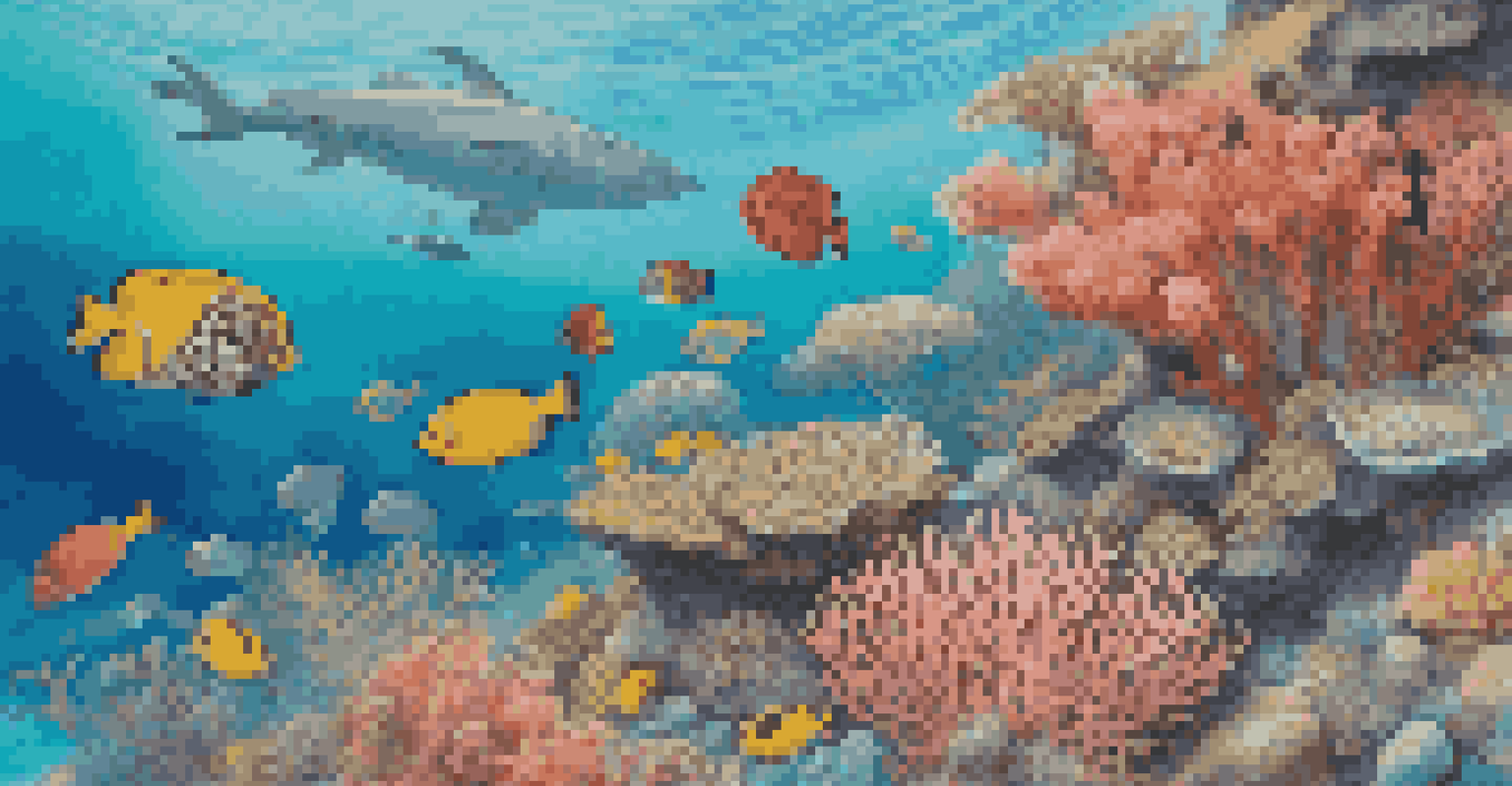Traveling to Restore: Conservation Projects Around the World

Understanding Conservation Tourism and Its Impact
Conservation tourism is a growing trend where travel serves a dual purpose: enjoyment and restoration. Travelers engage in activities that directly contribute to environmental preservation, from wildlife protection to habitat restoration. This form of tourism not only helps local ecosystems but also fosters a deeper appreciation for nature among visitors.
The greatest threat to our planet is the belief that someone else will save it.
Imagine trekking through a rainforest while knowing your entrance fee helps fund reforestation efforts. This connection between travel and conservation creates a unique experience that enriches your journey. Plus, it cultivates a sense of responsibility for the planet as you witness firsthand the beauty worth preserving.
As travelers become more conscious of their impact, the demand for sustainable travel options rises. Supporting conservation projects allows tourists to leave a positive footprint, ensuring that the world’s natural wonders remain intact for future generations.
The Galápagos Islands: A Living Laboratory
The Galápagos Islands are often referred to as a living laboratory due to their unique biodiversity. Visitors can participate in conservation programs that protect endangered species and restore native habitats. By joining these initiatives, travelers contribute to the ongoing efforts to preserve the islands' delicate ecosystem.

For instance, volunteer opportunities with local organizations allow tourists to assist in breeding programs for giant tortoises or participate in marine life surveys. Each small action can lead to significant impacts, helping to maintain the islands' status as a UNESCO World Heritage site.
Conservation Tourism Benefits Ecosystems
Travelers engage in activities that support environmental preservation, fostering appreciation for nature while leaving a positive impact.
Exploring the Galápagos not only provides stunning scenery and wildlife encounters but also instills a sense of stewardship. Travelers leave with memories of lush landscapes and the satisfaction of having played a part in conservation.
The Amazon Rainforest: Protecting the Lungs of the Earth
Traveling to the Amazon Rainforest offers an immersive experience in one of the most biodiverse regions on the planet. Visitors can engage in eco-tours that support indigenous communities and conservation efforts. This helps to safeguard the rainforest while providing tourists with a unique cultural experience.
Travel is the only thing you buy that makes you richer.
For example, programs like canopy walks and guided wildlife tours generate funds that support habitat preservation. Tourists get the chance to see rare species while knowing their visit aids in protecting these environments from deforestation and exploitation.
By participating in conservation-focused travel in the Amazon, you contribute to a larger movement to combat climate change. The rainforest's preservation is crucial for global health, making your journey impactful in ways that extend beyond your vacation.
Marine Conservation in the Great Barrier Reef
The Great Barrier Reef, one of the planet's most stunning natural wonders, is facing significant threats from climate change and pollution. Travelers can make a difference by participating in marine conservation programs that focus on coral restoration and wildlife protection. This hands-on approach not only educates visitors about marine ecosystems but also fosters a sense of connection to the ocean.
Volunteering for reef restoration projects allows tourists to plant coral and monitor marine life. Such experiences provide insight into the challenges faced by this fragile ecosystem. Every effort counts, and travelers can help ensure the reef's survival for future generations.
Cultural Heritage Through Travel
Conservation travel not only protects natural resources but also helps preserve the cultural heritage of local communities.
Visiting the Great Barrier Reef with a conservation mindset transforms a typical vacation into an opportunity to contribute to environmental efforts. The beauty of the reef becomes even more meaningful when you know you're helping to protect it.
Wildlife Conservation in Africa: Safaris with a Purpose
African safaris are not just about spotting the Big Five; they can also be powerful tools for wildlife conservation. Many tour operators offer experiences that directly support local conservation initiatives. By choosing these options, travelers contribute to protecting endangered species and preserving their habitats.
For instance, some safaris include visits to wildlife rehabilitation centers, where guests learn about efforts to save injured animals. Tourists can see how their participation not only enhances their experience but also aids in the survival of these species. This creates a meaningful connection between travelers and the wildlife they admire.
Engaging in wildlife conservation during a safari fosters a deeper understanding of the challenges faced by these animals. It empowers travelers to advocate for sustainable practices and become ambassadors for conservation long after they return home.
Restoration Projects in the Arctic: Climate Change Awareness
Traveling to the Arctic offers a firsthand look at the impacts of climate change, but it also presents opportunities for restoration. Various programs allow travelers to engage in projects aimed at protecting fragile ecosystems and wildlife. This experience highlights the importance of conservation in a rapidly changing environment.
For example, some organizations offer ice monitoring expeditions where participants help collect data on glacial melting. These projects not only contribute to scientific research but also raise awareness about climate issues affecting the Arctic. Travelers leave with a sense of urgency and responsibility regarding environmental stewardship.
Your Role in Sustainable Travel
Your travel choices, from eco-friendly accommodations to supporting local initiatives, play a crucial role in advancing conservation efforts.
The Arctic experience serves as a powerful reminder of the interconnectedness of global ecosystems. By participating in restoration efforts, travelers become part of the solution, advocating for change and inspiring others to take action.
Cultural Preservation through Conservation Travel
Conservation travel goes beyond environmental impacts; it also plays a crucial role in preserving cultural heritage. Many projects focus on sustainable tourism that benefits local communities while protecting their traditions. This approach ensures that cultural practices are not lost in the face of globalization.
For instance, travelers can engage in programs that support indigenous communities, allowing them to share their knowledge and traditions with visitors. This exchange enriches the travel experience and fosters mutual respect between cultures. It highlights the importance of preserving not just natural resources but also the heritage of the people who inhabit these regions.

In this way, conservation travel becomes a holistic experience, connecting people and nature. By supporting cultural preservation, travelers contribute to a more sustainable future for both the environment and the communities that rely on it.
Making a Difference: Your Role in Conservation Travel
As a traveler, your choices can significantly impact conservation efforts worldwide. Opting for eco-friendly accommodations, supporting local businesses, and participating in volunteer projects can amplify your positive influence. Each small decision contributes to a broader movement towards sustainable travel.
Consider researching destinations that prioritize conservation, ensuring your travel funds support meaningful initiatives. Whether participating in a wildlife survey or donating to a local conservation group, your engagement matters. It empowers communities and helps protect the natural beauty you love to explore.
Traveling with a purpose allows you to experience the world in a transformative way. By prioritizing conservation, you become part of a collective effort to safeguard our planet, ensuring that future generations can enjoy its wonders just as you have.